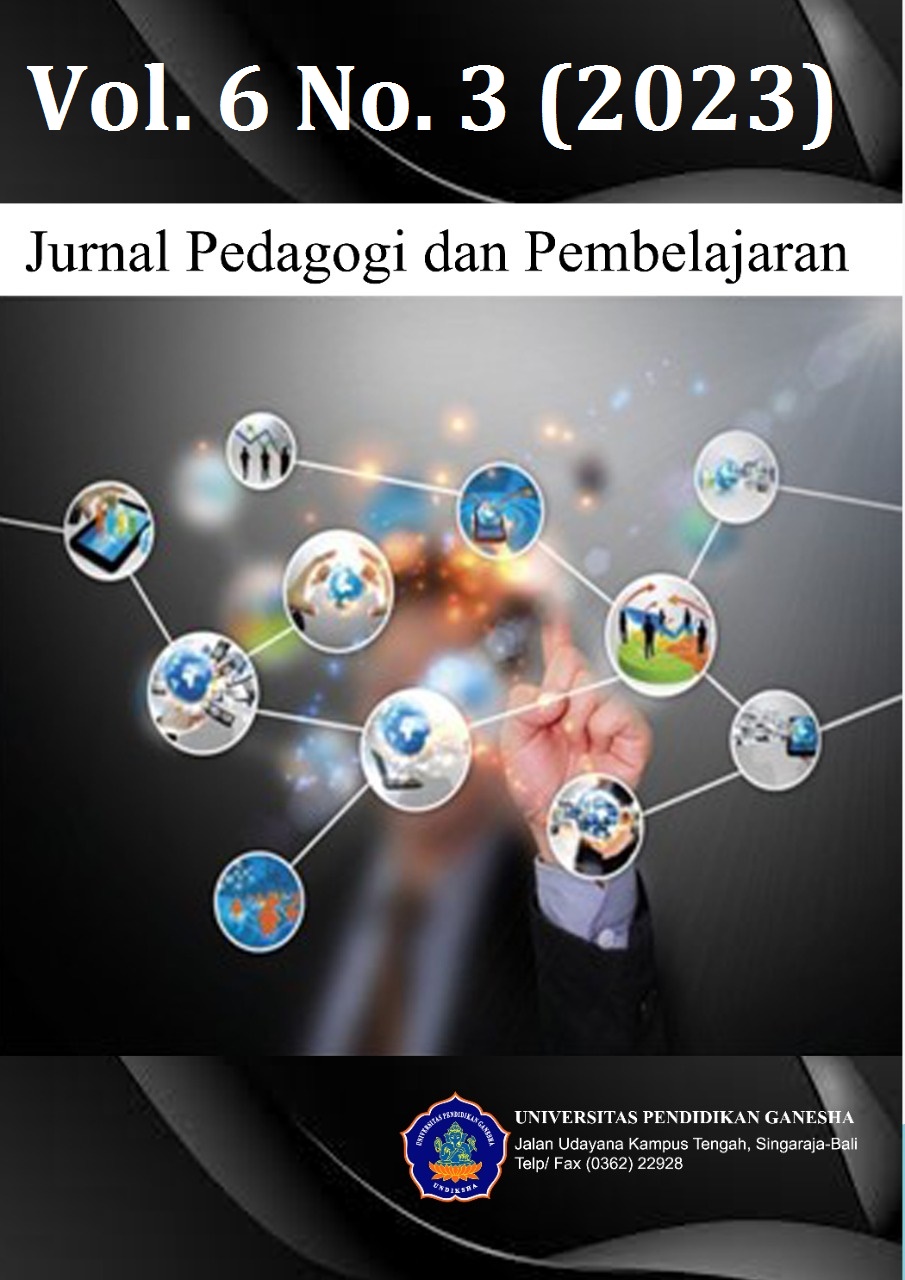Problem Based Learning Model with the TPACK Approach in the Numeracy Ability of Fifth Grade Elementary School Students
DOI:
https://doi.org/10.23887/jp2.v6i3.60863Keywords:
Problem Based Learning, TPACK Approach, Numeration SkillAbstract
The 2018 PISA results, Indonesian Education Report Card Data, and AKM Scores show that the numeracy skills of fifth-grade elementary school students in Indonesia still need to improve. One of the contributing factors is the dominance of the use of the lecture method in the learning process. This research analyzes the Problem-Based Learning Model with the TPACK Approach in the Numeracy Ability of Class V Elementary School Students. This research is an experimental research with a Nonequivalent Pretest post-test control Group Design. This research was conducted on fifth-grade elementary school students who were divided into an experimental group and a control group determined using the Cluster Random Sampling Technique. Data from this research was collected using a test method using a numeracy ability test instrument. Data were analyzed using the Polled Variance T-test because it has a homogeneous data variance. The results of this research show a significant difference in numeracy abilities in students who are taught using the Problem-Based Learning model with the TPACK Approach and in students who are not taught using this model. The Problem-Based Learning model with the TPACK approach can be used in the learning process, especially numeracy learning because this model can encourage students to learn independently so that students can discover and understand concepts through themselves.
References
Akcay, A. O., Semercioglu, M. S., & Güllü, H. (2022). The Relationship between Pre-service Primary School Teachers’ Perception of 21st-Century Skills, Mathematical Literacy Self-Efficiency, and Financial Literacy Attitudes and Behaviors. Mimbar Sekolah Dasar, 9(1), 81–97. https://doi.org/10.53400/mimbar-sd.v9i1.41270.
Ardian, A., & Munadi, S. (2015). Pengaruh strategi pembelajaran student-centered learning dan kemampuan spasial terhadap kreativitas mahasiswa. Jurnal Pendidikan Teknologi Dan Kejuruan, 22(4), 454–466. https://doi.org/10.21831/jptk.v22i4.7843.
Argaw, A. S., Haile, B. B., Ayalew, B. T., & Kuma, S. G. (2017). The effect of problem based learning (PBL) instruction on students’ motivation and problem solving skills of physics. Eurasia Journal of Mathematics, Science and Technology Education, 13(3), 857–871. https://doi.org/10.12973/eurasia.2017.00647a.
Ariyani, B., & Kristin, F. (2021). Model pembelajaran problem based learning untuk meningkatkan hasil belajar IPS siswa SD. Jurnal Imiah Pendidikan Dan Pembelajaran, 5(3), 353–361. https://doi.org/10.23887/jipp.v5i3.36230.
Boye, E. S., & Agyei, D. D. (2023). Effectiveness of problem-based learning strategy in improving teaching and learning of mathematics for pre-service teachers in Ghana. Social Sciences & Humanities Open, 7(1), 100453. https://doi.org/10.1016/j.ssaho.2023.100453.
Chaidam, O., & Poonputta, A. (2022). Learning Achievement Improvement of 1st Grade Students by Using Problem-Based Learning (PBL) on TPACK MODEL. Journal of Education and Learning, 11(2), 43. https://doi.org/10.5539/jel.v11n2p43.
Djonomiarjo, T. (2020). Pengaruh model problem based learning terhadap hasil belajar. Aksara: Jurnal Ilmu Pendidikan Nonformal, 5(1), 39–46. https://doi.org/10.37905/aksara.5.1.39-46.2019.
Firdaus, A., Asikin, M., Waluya, B., & Zaenuri, Z. (2021). Problem Based Learning (PBL) Untuk Meningkatkan Kemampuan Matematika Siswa. QALAMUNA: Jurnal Pendidikan, Sosial, Dan Agama, 13(2), 187–200. https://doi.org/10.37680/qalamuna.v13i2.871.
Hanik, E. U. (2020). Self directed learning berbasis literasi digital pada masa pandemi covid-19 di Madrasah Ibtidaiyah. ELEMENTARY: Islamic Teacher Journal, 8(1), 183. https://doi.org/10.21043/elementary.v8i1.7417.
Haqiqi, A. K. (2019). Telaah implementasi kurikulum 2013: tinjauan pada rencana pelaksanaan pembelajaran (rpp) mata pelajaran ilmu pengetahuan alam. Journal of Natural Science and Integration, 2(1), 12–18. https://doi.org/10.24014/jnsi.v2i1.7110.
Helmi, J. (2016). Penerapan Konsep Silberman dalam Metode Ceramah Pada Pembelajaran PAI. AL-ISHLAH: Jurnal Pendidikan, 8(2), 221–245. https://doi.org/10.35445/alishlah.v8i2.20.
Kanah, I., & Mardiani, D. (2022). Kemampuan Komunikasi dan Kemandirian Belajar Siswa Melalui Problem Based Learning dan Discovery Learning. Plusminus: Jurnal Pendidikan Matematika, 2(2), 255–264. https://doi.org/10.31980/plusminus.v2i2.1825.
Kara, S. (2021). An Investigation of Technological Pedagogical and Content Knowledge (TPACK) Competencies of Pre-Service Visual Arts Teachers. International Journal of Technology in Education, 4(3), 527–541. https://doi.org/10.46328/ijte.184.
Kasuga, W., Maro, W., & Pangani, I. (2022). Effect of Problem-Based Learning on Developing Science Process Skills and Learning Achievement on the topic of Safety in Our Environment. Journal of Turkish Science Education, 19(3), 872–886. https://doi.org/10.36681/tused.2022.154.
Laurie Murphy, S. J. C. of M. (2021). Teacher-Centered Versus Student-Centered Teaching: Preferences and Differences Across Academic Majors. Journal of Effective Teaching in Higher Education, 4(1). https://doi.org/https://doi.org/10.36021/jethe.v4i1.156.
Muhyidin, A., Rosidin, O., & Salpariansi, E. (2018a). Metode pembelajaran membaca dan menulis permulaan di kelas awal. JPsd (Jurnal Pendidikan Sekolah Dasar), 4(1). https://doi.org/10.30870/jpsd.v4i1.2464.
Muhyidin, A., Rosidin, O., & Salpariansi, E. (2018b). Metode Pembelajaran Membaca Dan Menulis Permulaan Di Kelas Awal. Jurnal Pendidikan Sekolah Dasar, 4(1), 30. https://doi.org/10.30870/jpsd.v4i1.2464
Nafiah, Y. N., & Suyanto, W. (2014). Penerapan model problem-based learning untuk meningkatkan keterampilan berpikir kritis dan hasil belajar siswa. Jurnal Pendidikan Vokasi, 4(1). https://doi.org/10.21831/jpv.v4i1.2540.
Ni’mah, A., & Dwijananti, P. (2014). Penerapan model pembelajaran think pair share (TPS) dengan metode eksperimen untuk meningkatkan hasil belajar dan aktivitas belajar siswa kelas VIII MTs. Nahdlatul Muslimin Kudus. UPEJ Unnes Physics Education Journal,3(2). https://doi.org/10.15294/upej.v3i2.3593.
Nurmansyah, U. (2020). Upaya Meningkatkan Hasil Belajar Peserta Didik Pada Materi Barisan dan Deret Aritmetika Melalui Pendekatan Saintifik TPACK. JUMLAHKU: Jurnal Matematika Ilmiah STKIP Muhammadiyah Kuningan, 6(2), 195–211. https://doi.org/10.33222/jumlahku.v6i2.1147.
Nurwahidah, L. S. (2017). Pembelajaran Literasi Berbasis Potensi Lokal Untuk Pengembangan Kearifan Lokal Dalam Upaya Pemberdayaan Perempuan. Caraka: Jurnal Pendidikan Bahasa Dan Sastra Indonesia Serta Bahasa Daerah, 6(2), 1. https://doi.org/10.31980/caraka.v6i2.83.
Ogweno, P. O., Kathuri, N. J., & Oywaya, A. (2021). Effects of Problem Based Learning Method and Lecture Teaching Method on Academic Achievement of Students. Education Quarterly Reviews, 4(1). https://doi.org/10.31014/aior.1993.04.01.186.
Paidican, M. A., & Arredondo, P. A. (2022). The Technological-Pedagogical Knowledge for In-Service Teachers in Primary Education: A Systematic Literature Review. Contemporary Educational Technology, 14(3), 1–15. https://doi.org/10.30935/cedtech/11813.
Papanikolaou, K. A., Makri, K., Sofos, I., Tzelepi, M. G., & Zalavra, E. (2022). Putting TPACK into action in learning design: The case of PeerLAND. Australasian Journal of Educational Technology, 38(6), 53–74. https://doi.org/10.14742/ajet.7556.
Rahmah, H. D., Ummah, L., Rahmadani, S., & Hasanah, L. (2022). Studi Literatur Perbandingan Pembelajaran Pancasila dalam Kurikulum 2013 dan Kurikulum Merdeka di PAUD. Jurnal Pelita PAUD, 7(1), 179–189. https://doi.org/10.33222/pelitapaud.v7i1.2516.
Rakhmawati, Y., & Mustadi, A. (2022). The circumstances of literacy numeracy skill: Between notion and fact from elementary school students. Jurnal Prima Edukasia, 10(1), 9–18. https://doi.org/10.21831/jpe.v10i1.36427.
Saal, L. K., Gholson, M., Machtmes, K., & Machtmes, R. (2018). Associations Between Adults’ Numeracy Skills and Employment Status : An Analysis of PIAAC’s U.S. Dataset. November. https://doi.org/10.13140/RG.2.2.24835.86569.
Sari, N. P., Utoyo, S., & Zubaidi, M. (2021). Pengaruh Media Pembelajaran Microsoft Power Point Terhadap Kemampuan Kognitif Pada Anak Usia Dini Kelompok B (5-6 Tahun). Student Journal of Early Childhood Education (SJECE), 1(2), 60–68. https://doi.org/10.35568/earlychildhood.v1i1.63.
Sitompul, H., Setiawan, D., & Purba, E. (2017). Pengaruh media pembelajaran dan motivasi belajar terhadap hasil belajar desain sistem instruksional pendekatan TPACK. JURNAL TEKNOLOGI INFORMASI & KOMUNIKASI DALAM PENDIDIKAN, 4(2). https://doi.org/10.24114/jtikp.v4i2.8761.
Suari, N. P. (2018). Penerapan model pembelajaran problem based Learning untuk meningkatkan motivasi belajar IPA. Jurnal Ilmiah Sekolah Dasar, 2(3), 241–247. https://doi.org/10.23887/jisd.v2i3.16138.
Tanjung, S., Baharuddin, Ampera, D., Farihah, & Jahidin, I. (2022). Problem Based Learning (PBL) Model with Technological, Pedagogical, and Content Knowledge (TPACK) Approach. International Journal of Education in Mathematics, Science and Technology, 10(3), 740–752. https://doi.org/10.46328/ijemst.2510.
Wenno, I. H., & Batlolona, J. R. (2021). The Effect of Problem Based Learning Model on Creative and Critical Thinking Skills in Static Fluid Topics. 9(3), 498–511. https://doi.org/10.24815/jpsi.v9i5.20829.
Wicaksana, E. J., & Sanjaya, M. E. (2022). Model PjBL pada Era Merdeka Belajar untuk Meningkatkan Sikap Ilmiah dan Kreativitas Mahasiswa Mata Kuliah Belajar dan Pembelajaran. Jurnal Imiah Pendidikan Dan Pembelajaran, 6(1). https://doi.org/10.23887/jipp.v6i1.41181.
Yusnita, N. C., & Muqowim, M. (2020). Pendekatan Student Centered Learning dalam Menanamkan Karakter Disiplin dan Mandiri Anak di TK Annur II. Jurnal Ilmiah Potensia, 5(2), 116–126. https://doi.org/10.33369/jip.5.2.%25p.
Downloads
Published
How to Cite
Issue
Section
License
Copyright (c) 2023 Sayu Rahma Indriani Rahayu

This work is licensed under a Creative Commons Attribution-ShareAlike 4.0 International License.
Authors who publish with Jurnal Pedagogi dan Pembelajaran agree to the following terms:- Authors retain copyright and grant the journal the right of first publication with the work simultaneously licensed under a Creative Commons Attribution License (CC BY-SA 4.0) that allows others to share the work with an acknowledgment of the work's authorship and initial publication in this journal
- Authors are able to enter into separate, additional contractual arrangements for the non-exclusive distribution of the journal's published version of the work (e.g., post it to an institutional repository or publish it in a book), with an acknowledgment of its initial publication in this journal.
- Authors are permitted and encouraged to post their work online (e.g., in institutional repositories or on their website) prior to and during the submission process, as it can lead to productive exchanges, as well as earlier and greater citation of published work. (See The Effect of Open Access)










